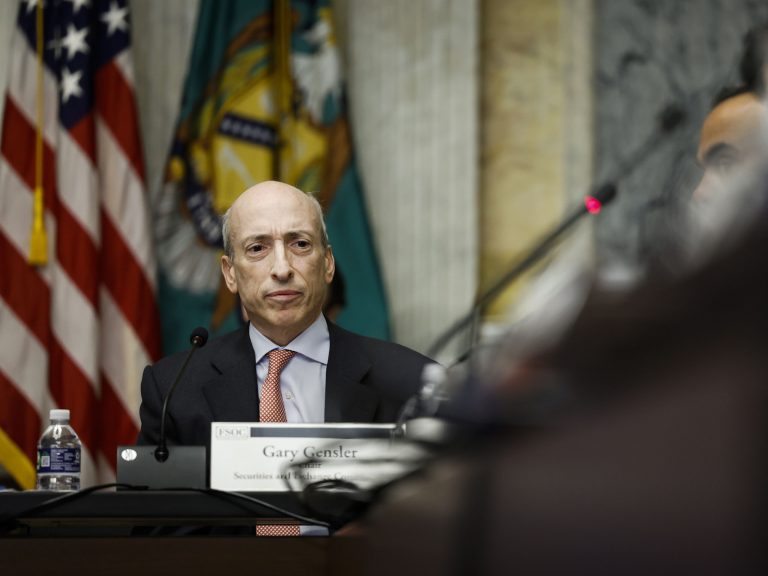
The Securities and Exchange Commission (SEC) is supposed to be an independent agency that protects investors, maintains fair and orderly markets, and facilitates capital formation. However, under the leadership of Gary Gensler, the SEC has become a rogue regulator that threatens the innovation and growth of the US capital markets.
Gensler has shown a disregard for the rule of law, a lack of transparency and accountability, and a hostility towards emerging technologies such as cryptocurrencies. He has also overstepped his authority and abused his power to pursue a personal agenda that harms investors and businesses.
In a surprising move, Representative Warren Davidson, a Republican from Ohio, has introduced a bill that would remove Gary Gensler from his position as the chairman of the Securities and Exchange Commission (SEC). The bill, titled the “SEC Regulatory Accountability Act“, accuses Gensler of overstepping his authority and harming American investors and businesses.
Tekedia Mini-MBA edition 16 (Feb 10 – May 3, 2025) opens registrations; register today for early bird discounts.
Tekedia AI in Business Masterclass opens registrations here.
Join Tekedia Capital Syndicate and invest in Africa’s finest startups here.
According to Davidson, Gensler has been pursuing an “aggressive and partisan agenda” that threatens the innovation and growth of the crypto industry, as well as other sectors of the economy. Davidson claims that Gensler has ignored the will of Congress and the courts and has acted in an arbitrary and capricious manner.
That is why I support the SEC Stabilization Act, a bill introduced by Congressman Warren Davidson and co-authored by Congressman Tom Emmer, that aims to reform the SEC and fire Gary Gensler as its chair. The SEC Stabilization Act would make several changes to the structure and governance of the SEC, such as:
Removing Gensler from office and requiring a new chair to be appointed by the President and confirmed by the Senate.
Adding a sixth commissioner to the SEC, so that no party can hold a majority on the commission.
Creating an executive director position to oversee the day-to-day operations of the SEC and report to the commissioners.
Limiting the rulemaking, enforcement, and investigation powers of the chair and requiring consensus among the commissioners for any major actions.
Establishing an advisory committee on digital assets and financial technology to provide guidance and recommendations to the SEC on these issues.
These reforms would ensure that the SEC is more balanced, accountable, and responsive to the needs and interests of investors and market participants. They would also prevent any future chair from abusing their power and imposing their personal views on the market.
Gary Gensler has proven to be a bad faith regulator who does not respect the role and mandate of the SEC. He has created uncertainty and confusion in the market, especially in the crypto space, by refusing to provide clear and consistent guidance on how securities laws apply to digital assets. He has also initiated frivolous lawsuits against crypto companies such as Ripple and Coinbase, without any legal basis or due process.
Gensler’s actions have stifled innovation and competition in the US capital markets and have driven investors and entrepreneurs to seek more friendly jurisdictions abroad. He has also damaged the reputation and credibility of the SEC as a fair and impartial regulator.
It is time for Congress to act and pass the SEC Stabilization Act, which would restore order and stability to the SEC and fire Gary Gensler as its chair. The US capital markets deserve better than a tyrannical chairman who undermines their growth and prosperity.
The bill would require Gensler to submit a report to Congress within 30 days of its enactment, explaining the rationale and legal basis for each rule or regulation that he has proposed or adopted since taking office in April 2021. The bill would also prohibit Gensler from issuing any new rules or regulations until he receives approval from Congress.
Davidson’s bill is unlikely to pass in the Democrat-controlled House of Representatives, let alone in the Senate. However, it reflects the growing frustration and opposition that Gensler has faced from some lawmakers and industry groups, especially in the crypto space. Gensler has been vocal about his intention to regulate crypto assets and platforms more strictly, arguing that they pose significant risks to investors and financial stability.
Gensler has not yet responded to Davidson’s bill, but he has previously defended his actions and vision for the SEC. He has said that he is committed to protecting investors, promoting fair markets, and fostering innovation. He has also expressed his willingness to work with Congress and other stakeholders to create a clear and consistent regulatory framework for crypto.



